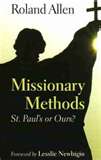Church Planting
Fall 2007
by Joel Comiskey
I love the topic of church planting because it’s the natural result of raising up a disciple (leader) who can make other disciples (new leaders). Some of those disciple-makers will want to continue the process all the way to starting a cell church plant.
As I’m writing a book on church planting, I once again find myself in love with the writings of Roland Allen (1868 – 1947). Allen was born in England, the son of an Anglican priest but was orphaned early in life. Allen spent two periods in Northern China. These early experiences led him to a radical reassessment of his own vocation and the theology and missionary methods of the Western churches. Allen became an early advocate of establishing Churches which from the beginning would be self-supporting, self-propagating, and self-governing–rather than simply imitating Western Christianity.
Allen’s approach to Mission strategy for indigenous Churches is based on the study of Saint Paul’s missionary methods. He believed that Paul’s recognition of the church as a local entity and trust in the Holy Spirit’s indwelling within the converts and churches was the mark of his success. Allen felt that the people of his day were unable to entrust their converts to the Holy Spirit and rely on the Holy Spirit’s work in them. Allen wrote a MUST READ book called Missionary Methods: St Paul’s or Ours? which was first published in 1912.
He also wrote an excellent book called The Spontaneous Expansion of the Church. Allen’s view became increasingly influential, though Allen himself became disillusioned with the established churches. He spent the last years of his life in Kenya, establishing a church of his own.
In ten years Paul established the church in four provinces of the Empire: Galatia, Macedonia, Achaia and Asia. Before AD 47 there were no churches in these provinces. In AD 57 Paul could speak of his work being accomplished.
In his book Missionary Methods: St. Paul’s or Ours? Allen writes:
This is truly an astonishing fact. That churches should be founded so rapidly, so securely, seems to us today, accustomed to the difficulties, the uncertainties, the failures, the disastrous relapses of our own missionary work, almost incredible. Those who write off what Paul did as “exceptional” “ one-of-a-kind” and “not applicable” look to other texts for examples. Yet, this is what the Holy Spirit has given us. And isn’t it true that all Scripture is given for our learning? The bottom line is that just about all church planting methods are placed upon Paul. Most church planters look to Paul and the Scriptures for justification of what they’re doing. So it is extremely relevant to ask what Paul did and whether we should follow this. We westerners have the tendency to want to promote everything we are and do as the right way. In other words, we go to cultures and to places and we establish our western style of thinking. This surely is not in tune with Paul the apostle and his methods. There’s a validity of trying to discover what the apostle Paul did and how his strategy lines up with our own strategy roland allen’s booktoday.

Allen goes on to assess the practice back in the days of English missions of first securing land, then a building, and there’s always the plea for more funds to finance these expensive endeavors. One of the key reasons for this is:
. . . the prevalence of the idea that the stability of the church in some way depends upon the permanence of its buildings. And of course, since we’re part of this heritage, we do the same thing. We think that the building makes the church plant secure, when in fact it does not. When we have secured a site and buildings we feel that the mission is firmly planted; we cannot then be easily driven away. A well-built church seems to imply a well-founded, stable society. Yet, we start mixing the metaphors and we assume that the building has something to do with the actual church, when it does not. So the externals of religion precede the inculcation of its principles. We must have the material establishment before we build the spiritual house.
Allen goes on to say, “Christianity is not an institution, but a principle of life. By importing an institution, we tend to obscure the truly spiritual character of our work. We take the externals first and so we make it easy for new converts to put the external in the place of the internal.”
My prayer is that God would raise up an army of church planters who want nothing else but God’s work in their midst. How we need a cell church planting movement that can rapidly expand and doesn’t have to be tied to one place or one building. We have to be so careful not to bind members to a building program or heaps of programmatic tasks in order to maintain the program. It’s all about life and reality rather than externals.
Roland Allen noticed the tendency among the Anglican churches of his day to make people dependent on paid clergy. Allen writes,
The facts are these: St. Paul preached in a place for five or six months and then left behind him a church, not indeed free from the need of guidance, but capable of growth and expansion. For example, according to Ramsay, St. Paul preached in Lystra for about six months on his first missionary journey, then he ordained elders and left for about eighteen months. Professor Ramsay calculates that St Paul did not stay in Thessalonica more than five months, and he did not visit the place again for over five years, yet he writes to ‘the church of the Thessalonians’ and speaks of it as being on the same footing as ‘the churches of God in Judea.’ At Corinth St. Paul spent a year and a half at his first visit and then did not go there again for three or four years, but he wrote letters as to a fully equipped and well-established church” (Roland Allen, Missionary Methods: St. Paul’s or Ours? p. 84). church planting

When we read about the Paul’s amazing feat, we often scratch our heads. How did he do this? Were these people already moral, spiritually prepared people? Why didn’t Paul take more time for baptismal classes, Christian Education cycles, etc.? Allen continues:
We commonly attempt to alleviate the sense of oppression by arguing, first, that his converts were people wholly and totally different from ours, and then, that as a matter of fact he did not really leave them, because he was constantly in touch with them by messengers and by letters.” Yet, the facts indicate that they were people totally from heathen backgrounds, steeped in heathen philosophies. The backgrounds of the people back then make those today look very civil and righteous. And today we even have the entire Bible printed for people to read and use. Paul didn’t have that advantage. Nor was it Paul’s practice to leave someone behind, although Luke appears to have stayed behind in Philippi. Yet, even though Paul was in touch with these congregations, there’s a distinct difference with having a paid person in one place all the time. This was simply not the case with Paul. ” (Roland Allen, Missionary Methods: St. Paul’s or Ours? p. 85ff).
I have to ask myself whether I’m allowing people to become overly dependent on me. I have the tendency to plant the church around myself and never really leave it with anyone. I need to remember the necessity of planting Christ’s church, so that it can freely multiply. My prayer is that I could establish a church planting center of doable church plants. Allen writes:
One of the ways that Paul taught the people was through mutual encouragement. Allen says, “The meetings of the church were gatherings for mutual instruction. Anyone who had been reading the book and had discovered a passage which seemed to point to Christ, or an exhortation which seemed applicable to the circumstances of their life, or a promise which encouraged him with hope. . . produced it and explained it for the benefit of all. . . . Paul would draw the people out to instruct one another, rather than converting them into hearers. By this means St Paul was always calling out more and more the capacities of the people in the church (Roland Allen, Missionary Methods: St. Paul’s or Ours? p. 85ff).
We have the tendency of making hearers of our people. The people turn into hearers of the word rather than doers. The church is so weak in North America because people can check in and out after hearing the gospel message. There’s not a strong connection between cell, celebration, training and leadership.
